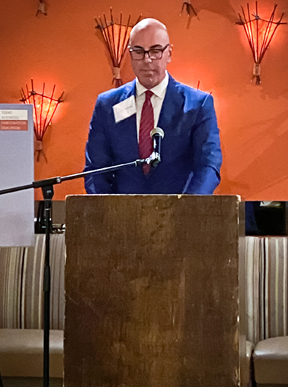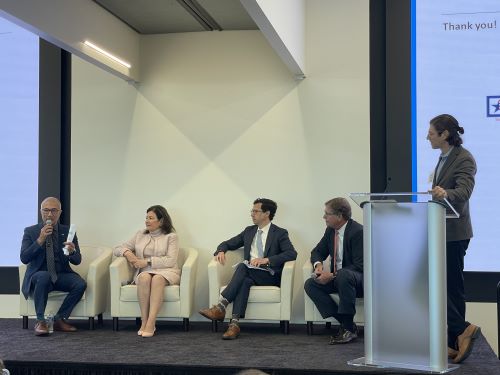Business Leaders Call for Bipartisan Immigration Reform at Dallas TBIC Event
 Lawmakers and business leaders attended a recent fundraiser hosted by the Texas Business Immigration Coalition in Dallas to discuss the critical role immigrants play in the North Texas economy and called for commonsense bipartisan immigration reform.
Lawmakers and business leaders attended a recent fundraiser hosted by the Texas Business Immigration Coalition in Dallas to discuss the critical role immigrants play in the North Texas economy and called for commonsense bipartisan immigration reform.
Several business leaders in attendance highlighted the valuable role that immigrants serve in the growing Texas workforce and economy, especially in the current state of record low unemployment.
“We have a robust talent pool but it’s essential to continue to grow that talent pool for our economy and for north Texas businesses...Immigrants are critical to our talent pool, especially as more businesses flock here from other parts of the nation because Texas has an unemployment rate of 3.5%; that’s pretty low,” said Bill Miller, Senior Executive Advisor for Beecken Petty O’Keefe & Company.
“Immigrants are extremely important to our economy and specifically my business as a manufacturer. With unemployment at record lows, the lack of available labor is a constraint to my businesses and across our entire economy,” said Brenda Haupt, Owner & COO of Globe Products Co., Inc.
Adam Lampert, CEO of Manchester Care Homes, discussed how although his assisted living company works hard to recruit American workers, it’s often foreign born workers who answer the call.
“We certainly don’t discriminate against hiring Americans, there is nothing that we do as a company that focuses on foreign born workers…We are out hiring aggressively in this market and we are knocking on all doors looking for Americans to come work for us. They are not the ones answering the call,” Lampert said. “It’s important that we have a mechanism in our immigration policy to allow workers into our country. I’m not talking about citizenship necessarily, but I’m talking about foreign born workers who have the ability to get a visa to come in and do work in my industry and others in Texas.”
Another topic that was addressed was the importance of encouraging Congress to pass bipartisan immigration reform, especially in regards to creating a method for DACA recipients to obtain permanent legal status while the fate of their current status awaits a pending Supreme Court decision.
“If DACA recipients lose their eligibility to work legally in our state, the economy could lose $6 billion in GDP annually. That’s not something small, that’s huge and that’s a big impact…That’s a really important thing that we have to protect,” Miller pointed out.
“I know dreamers who have been raised and educated here... We must act to clear a path to permanent status for law abiding dreamers and undocumented workers living here,” said Haupt.
Chris Wallace, CEO of the North Texas Commission, cited a study his organization commissioned through New American economy that showed 92,407 DACA eligible residents earned $1 billion and paid $200 million in taxes leaving them with $820.5 million in spending power in 2017 (DFW area). He also expressed optimism towards the ability of lawmakers to pass bipartisan immigration legislation that will protect DACA recipients’ legal status.
“I think the court is probably going to punt and say, 'Members of Congress, it’s your time now to fix immigration…' We’ve been working with our 15 members of congress, 13 representatives plus Cornyn and Cruz. Everybody has said that it should be bipartisan that they think they can come to an agreement regarding dreamers so I’m very optimistic that it’s going to happen,” Wallace said.
US Rep. Colin Allred expressed hope and optimism that he and his colleagues can work in a bipartisan manner to pass comprehensive immigration reform if they can find the political will.
“We need to take action on this, we need to have comprehensive immigration reform… I still have hope because in my conversations with my Republican colleagues there’s not a whole lot of difference in terms of what we believe needs to be done. It’s the political will to actually do it that seems to be the issue,” Allred said.
An issue raised by Dallas County Judge Clay Jenkins was the substantial amount of federal funding that Texas communities could lose if residents do not fill out the census this year. He says there is real “baked in” fear among Texas’ immigrants residents due to the citizenship question, even though it will not be on the form, and data can only be used to produce statistics.
“A 1% undercount costs $40 million a year in services for which our local [Dallas County] taxpayers will have to make up the difference if that federal money doesn’t get here. An 8% undercount in Dallas County costs $3.2 billion over a 10 year period,” Jenkins said.
Andrea Ramos Fernandez, San Antonio & Austin Business Outreach Manager for TBIC and a DACA recipient herself, shared an emotional story with the audience. She said that although her family has faced many difficulties with her parents lacking legal status, she still loves America and believes in everything it stands for.
“When I was nine, my mother and I migrated to this country. My mother left everything behind…in order to give me everything she could…both of my parents still hold multiple jobs to bring a meal to our table. They have been servers and bartenders for hundreds of people across the state. They have helped people celebrate weddings, anniversaries and holidays while they themselves missed those special milestones in our family because of that work. Their examples gave me a clear view of what hard work means and what sacrifice looks like… My DACA status is currently in the hands of the Supreme Court. They could make a decision as soon as tomorrow. I want to stay here. I want to continue to contribute to this American promise that we all love and hold dear. I love America, I believe in everything that it stands for. I have cheered for every success we have held, and I have mourned for every loss as every success and every loss is my own,” Fernandez said.
The Texas Business Immigration Coalition (TBIC) promotes commonsense bipartisan immigration reform that advances Texas economic competitiveness, provides Texas companies with both the high-skilled and low-skilled talent they need, and allows the integration of immigrants into our economy as consumers, workers, entrepreneurs, and citizens.








